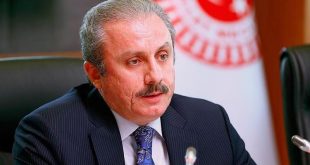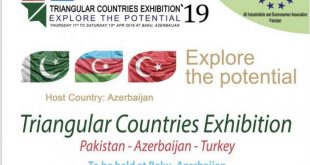SPACE is unbelievably vast having unlimited “mysteries” has now opened a new window of
“opportunity” for Pakistan, Azerbaijan and Turkey.
Its “luminescent galaxies” offer golden opportunity for further gelling and immense economic growth.
Its black holes may be counter-productive to “harmonize” economic preferences, preferential sectors and socio-economic prosperity of three brotherly countries. Moreover, space “supremacy” has had also been sign of superior military might and muscles during cold war.
It has now been further “revisited” and “designed” the regional geopolitical and geostrategic orientations too.
Most recently, Turkey expressed its comprehensive plans to cooperate with Pakistan and Azerbaijan in the field of space technology.
Pakistan, Turkey and Azerbaijan recently entered into a new phase of a strategic partnership with the visits of Turkey’s Foreign Minister Mevlut Cavusoglu and Azerbaijan’s Foreign Minister Jeyhun Bayramov to Islamabad last month.
The three brotherly countries announced to improve collaboration in political, strategic, economic, security, science and technology fields.
It hoped that the collaboration in space technology will take the partnership to a new level. Interestingly, Pakistan launched its first communications satellite PAKSAT-1R in August 2011 which highlighted the defining moment in the country’s space program.
Pakistan launched a remote sensing (PRSS-1) satellite and a technology evaluation satellite (PakTES-1A) after SUPARCO and the China Great Wall Industrial Cooperation (CGWIC) signed a space cooperation agreement in 2018.
Furthermore, Pakistan was the first foreign country to shift the China-based Global Positioning System (GPS) system called BeiDou which ultimately reduced its dependency on (GPS) of the United States in both civil and military sectors during 2014.
It hopes that extended space collaboration with China and now Turkey will pay its dividends to Pakistan for meeting the goals of Pakistan’s Space Program 2047 and the country’s future scientific requirements.
Turkish Minister of Industry and Technology Mustafa Varank was quoted as saying that Turkey is at the signing stage of agreements with space agencies of Pakistan and Azerbaijan to improve collaboration in the use of space for civilian purposes which requires international cooperation.
Meanwhile, on 09 February 2021, Turkish President Recep Tayyip Erdogan showcased Turkey’s ambitious 10-year national space program which included sending Turkish astronauts into space, developing a new generation of satellites, building a spaceport and reaching the Moon by 2023 a primary and most important mission of the programme.
The Turkish President presented country’s first space programme that highlighted Ankara’s plans to compete with other countries both on the world stage and beyond.
In January 2021, Space-X launched a Turkish communications satellite into orbit.
While speaking during a live televised event the President highlighted salient features of the Turkish space program with the clear intention to make contact with the moon in 2023, the centennial of the founding of the Turkish Republic.
It is worth mentioning that under Erdogan’s leadership, Turkey has planned to re-establish itself as a creditable world power.
The successful expansion of the Turkish space agency (TUA) would make the country one of just a handful worldwide capable of space exploration.
Turkey established its space agency in December 2018 after the ruling Justice and Development Party (AKP) made the project an election campaign promise earlier that year, but complex and complicated economic challenges posed troubles getting off the ground for the start of space programme.
TUA’ is of the view point that it will create technical and highly specialized jobs and reduce the brain drain of emigrating scientists and researchers.
Turkey has revolutionized the concepts of war gaming and war theatre and secured grand success in domestically produced drone and rocket technology over the last few years, which has had made significant contribution to military campaigns in Libya, Syria, Iraq and Nagorno-Karabakh.
The state-owned rocket and missile manufacturer Roketsan announced it had successfully test-launched a sounding rocket into space in November last year.
In January, Erdogan had a telephone call with Elon Musk, the Chief Executive of Space-X, the private US space exploration company, about technological cooperation with Turkish companies.
In cooperation with Space-X, Ankara launched the next-generation Türksat 5A communications satellite, which will be used for both civilian and military purposes, into orbit from the US later the same month.
On the other hand, Azerbaijan’s space program was mostly carried out through international cooperation during the Soviet era.
Since its inception, Azerbaijani space industry boosted as new formation set up under the state program for development of space industry.
Since the first satellite of Azerbaijan (Azerspace-1) launched, interest in space sector and awareness have started to grow gradually among the government and public alike.
It seems that Azerbaijan has great potential for the promotion of space related activities under SGAC coordination and establishes a communication between young national space network and the SGAC.
Now, Azerbaijan has its own space agency i.e. Azerbaijan National Aerospace Agency, (ANASA), observatory centre (Shamakhi Astrophysical Observatory) and public owned satellite operator company (Azercosmos OJSCo) which shows its holistic approach towards space development in the country.
In February, Azerbaijan launched its first commercial communications satellite Azerspace-1.
Designed and built by the Orbital Science Corporation, the US manufacturer of spacecraft and missile defence boosters, Azerspace-1 is designed to tap into the massive demand for high-quality broadband internet, data and broadcasting services across the Caucasus, Central Asia and Africa.
The satellite was sent into orbit by Azercosmos, an Azerbaijani state-owned company and the first satellite operation in the Caucasus. Established in 2010, Azercosmos implements the launch, operation and exploitation of Azerbaijani satellites.
It is planned that the 3.2-tonne satellite, currently in a Malaysia-owned an orbital slot as part of an arrangement between Azercosmos and MEASAT Satellite Systems of Malaysia, will be controlled by local Azeri specialists at the control centres in Baku and Nakhchivan.
Being a prominent regional expert of Azerbaijan and Turkey, I uphold that extended space cooperation among the three brotherly countries will further diversify their national economies, improvement in service, tele-communication, entertain sectors and further strengthen their peaceful space program for national security in the days to come.
Successful test firing of Shaheen-III will provide launching pad for Pakistan to enter in the space age very soon.
Dr Mehmood-ul-Hassan Khan
Director, Geopolitics/Economics Member Board of Experts, CGSS
 Oval Useful news from Azerbaijan and Caucasus
Oval Useful news from Azerbaijan and Caucasus

